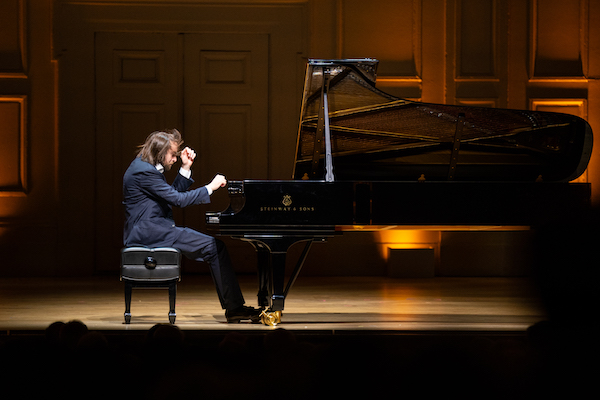Concert Review: Pianist Daniil Trifonov — He Covers the Waterfront
By Aaron Keebaugh
Daniil Trifonov’s long-awaited return to Symphony Hall showed that he continues to embody the fullness of the great Russian pianistic legacy.

Daniil Trifonov in action at Boston’s Symphony Hall. Photo: Robert Torres/Celebrity Series of Boston
When he last came to Boston for a solo recital in 2015 (Arts Fuse review), Daniil Trifonov was greeted with such anticipation that listeners nearly broke into fisticuffs outside of Jordan Hall over a single ticket.
Eight years on, enthusiasm for the young Russian pianist continues unabated. His long-awaited return to Symphony Hall on Wednesday night, on behalf of the Celebrity Series, delivered all the promised panache and probing interpretive depth. As this performance revealed, Trifonov continues to embody the fullness of the great Russian pianistic legacy.
Trifonov has achieved that feat by striking an ideal balance between precision and poetic musicianship. He leans into each expressive gesture without resorting to histrionics. To be sure, his technique is astounding: runs and arpeggios fly by with both vigor and clarity. But his greatest strengths lie in how he revels in the soft and pristine. His slow movements routinely resonate with an uncannily haunting distance. What’s more, he lingers tastefully in all the right places; this is virtuosity that emanates as much inward solace as outward extravagance.
Wednesday’s program of Rameau, Mendelssohn, Mozart, and Beethoven proved to be the ultimate showcase for such expressivity. The former’s Suite in A minor, RCT 5, was a study in contrasts. Dance movements didn’t lilt as much as they served as vehicles for searching lyricism. Trifonov’s inclination to push and pull at the tempo encouraged phrases to flow naturally. Mordents and trills injected into the Allemande and Courante supplied the right dabs of decoration without obscuring the sense of line. Inner voices rose to the fore and sang fervently before fading away.
There was levity to match. Each voice of “Les trios mains” tittered. “La Triomphante” belted out joyfully, the ensuing “Fanfarinette” rang like a crystal goblet. Trifonov treated each variation of the “Gavotte et six doubles” with requisite Baroque fire.
That was also the effect Trifonov sought in Mendelssohn’s Variations sérieuses, heard for the second time in Boston in a single week. While András Schiff took a delightfully understated approach (Arts Fuse review of the Celebrity Series recital at Jordan Hall last Friday), Trifonov chose bravura. He supplied the palpable assurances of the third variation. Phrases in the fourth yearned for resolution that tipped the music briefly toward light. Even the wavering harmonies of the fifth took on greater dimensions because of the wide range of his dynamic shading.
At other moments, Trifonov revealed an almost orchestral sense of texture. Figures in the 10th variation brooded quietly, while the melodies in the 11th swept along in full grandeur. Dissonances in the 13th flickered like a candle in a breeze, a hint of warmth amidst the darkness.
Trifonov rendered Mozart’s Sonata No. 12 in F major, K. 332 with just as much fervor. And, though the approach may have been anachronistic, it worked. He made the transitions of the opening movement feel less like episodic contrasts than wild mood swings. The main theme of the Allegro charged forward with wheeling abandon. Transitions into the minor key carried whiffs of poignant sturm und drang. He even played the finale at an electrifying tempo rarely encountered in Mozart. Still, in the delicate moments, Trifonov’s generous rubato shed light on the subtleties of every line and cadence. Most affecting was the Adagio, where phrases, barely rising above a whisper, glowed like embers.
Beethoven’s “Hammerklavier” Sonata, Op. 106, bold and nearly frenzied from the onset, resulted in a colorful canvas. Trifonov’s pearly tone made the soft passages shimmer. A deft application of greater weight drew out the inner voices of the development. The ensuing Scherzo bounded impishly, the Adagio ranged from hymnic serenity to fleeting humor during its central waltz. And the pianist released all of the fugue’s coiled tensions in the clangorous final chords.
Applause brought Trifonov back to the stage multiple times for bows. He offered two encores: Art Tatum’s bluesy “I Cover the Waterfront,” and the epilogue from Mompou’s Variations on a Theme by Chopin, shaped with ethereal delicacy.
Aaron Keebaugh has been a classical music critic in Boston since 2012. His work has been featured in the Musical Times, Corymbus, Boston Classical Review, Early Music America, and BBC Radio 3. A musicologist, he teaches at North Shore Community College in both Danvers and Lynn.
